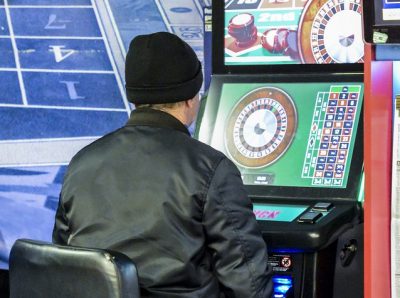
AlexRotenberg / bigstock.com
The case surrounding Fixed Odds Betting Terminals has raged on for some time now and I’ve written a number of blogs about it over the previous few months. As a quick refresher, campaigners have wanted the government to curb their influence by reducing the maximum stake to £2, whilst those in the gambling industry have long maintained that a major cut to the maximum stake, which has previously been at £100, would have devastating consequences. To give the government its due, they’ve thought long and hard about the issue in order to come to the best conclusion. They have been briefed by bookmakers, independent experts and those that have suffered at the hands of the machines that critics call ‘the crack cocaine’ of gambling.
After that long and thorough investigation into the issue, the government has finally announced its decision to cut the maximum stake to £2, just as campaigners were hoping. Despite strong crusading on the issue from bookmakers and those with ties to the industry, the Department for Digital, Culture, Media and Sport remained strong in their conviction that the machines have been little short of a ‘social blight’. As the dust settles on the arguments and campaigning, the questions that will hang in the air are ‘why did they reach that conclusion?’ and ‘What does that mean for the future of the betting world?’ I’ll attempt to answer those questions here.
Why The Government Has Reached Its Decision
The reasoning behind the government’s decision can best be summed up by the thoughts of the Secretary of State of the Department for Digital, Culture, Media and Sport, Matt Hancock, who didn’t mince his words in the aftermath of the government’s confirmation of its decision. He said, “These machines are a social blight and prey on some of the most vulnerable in society”. That, it seems, has been the crux of the issue as far as the politicians involved are concerned. They have felt that bookmakers have seemed to target areas of high deprivation with the Fixed Odds Betting Terminals, resulting in people losing in excess of £1000 more than two hundred thousand times in the space of a year.
The Gambling Commission announced recently that the industry made a Total Gross Gambling Yield of nearly fourteen billion pounds between April 2016 and March 2017, of which around two billion pounds came from FOBTs. That was the equivalent of around £5 million each day of the year, meaning that each machine made an average of £52,887 over twelve months. Since 2009, Fixed Odds Betting Terminals have seen players’ losses increase by 73%, in spite of the fact that there have been less than 10% more machines introduced during the same period. Essentially, whichever way you look at it it appears as though the machines have made the betting industry a huge amount of money at the same time as the average punter has been losing money at a worrying rate.
Shop Closures Won’t Sway The Government’s Choice

Closed Betting Shop in Andover
The government also appears to have been unmoved by the fears of bookmakers that cuts to the maximum stake as severe as the drop from £100 to £2 will result in them having to pull money out of other sections of the gambling industry to compensate. One of the big fears, promoted by the British Horseracing Authority, is that this sort of stake reduction will see the horseracing industry lose up to £60 million a year, with bookies withdrawing sponsorship of races. The even bigger losses will come about if bookmaking companies feel that they have to close shops in order to cope with the drop in profits taken from Fixed Odds Betting Terminals. In recent times, bookmakers have opened additional shops in order to cope with the rules that say that they’re not allowed more than four of the machines in the same venue, such is the extent to which they’re profitable for them.
Each shop has to pay money for the rights to broadcast horse racing in its shops, so if the shops end up closing then it’s fairly obvious that the horse racing industry will lose that money. Yet Mr. Hancock believes that that shouldn’t influence any decision on cuts to the FOBT’s stake, saying, “Horse racing should not be financed on the back of this misery…[it can] be financially successful without having to ruin the lives of people using these machines”. He is the Conservative MP for West Suffolk, meaning that the huge horse racing town of Newmarket comes under his representation. Yet he was nevertheless convinced that the industry will be able to survive without the money brought in by the terminals.
The Industry Isn’t Happy
Unsurprisingly, members of the gambling industry don’t agree with Matt Hancock and feel as though the future now looks bleak for them. Profits from Fixed Odds Betting Terminals have gone from around £1.5 billion to closer to £1.8 billion at the same time as money made over the counter at physical bookmakers has dropped from close to £1.5 billion to around £1.3 billion. That’s led Fred Done, the owner of Betfred, to say that the government’s decision will lead to shop closures and associated job losses. The Association of British Bookmakers have gone even further, specifying that they expect more than “4,000 shops to close and 21,000 colleagues to lose their jobs”. It’s believed that William Hill will be one of the worst hit, with close to 40% of the company’s shops now at risk of being closed.
Regardless, the bookmakers have received little sympathy from their critics. The Labour MP David Lammy declared the use of FOBTs as being ‘a model of vulture capitalism’, saying that government’s decision sent forward a ‘simple message’ to bookies. The horse racing broadcaster Kevin Blake said that the choice to reduce the maximum stake to £2, whilst likely to lead to short-term hardship for both the racing industry and bookmakers, was ‘a great result for British society’ via his Twitter account. Even the Chief Executive of Paddy Power Betfair, Peter Jackson, said that he felt that the choice would result in a ‘positive development for the long-term sustainability of the industry’; though some have pointed out that Paddy Power Betfair stand to lose about 3% of their profits, compared to 18% for GVC and 25% for William Hill.
Ultimately Money Decided The Outcome
For all of the government’s posturing, it still remains the suspicion of some that no clear loss of money for the state as a result of the decision is what helped to sway ministers into making their decision. It emerged towards the end of April in 2018 that the Treasury felt that the money lost in tax could be made up in other ways. Despite the Gambling Commission’s recommendation of a drop in stake to £30, the Departments for Digital, Culture, Media and Sport decided to go even further on account of the fact that increased taxes on online gambling would likely help the government to make up any losses. The details of this raise in taxes will come out with the government’s next budget.
Though some are cynical about the decision, feeling that the government probably wouldn’t have made it if they couldn’t see a way of ensuring no major loss of income for the Treasury, it has also announced numerous other things that will be introduced to help the most vulnerable in society. This includes the likes of spending limits being introduced for online accounts until affordability checks have been carried out on customers, age checks on customers being tightened, an investigation of the damage done by problem gambling by Public Health England and a possible review of the age requirements for buying National Lottery tickets. It’s also important to point out that no changes to the current law will be carried out until after it’s been approved by Parliament, with a period of adjustment allowed to give bookmakers and the racing industry cope with the potential incoming losses.



